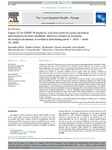Impact of the COVID-19 pandemic and associated non-pharmaceutical interventions on other notifiable infectious diseases in Germany: An analysis of national surveillance data during week 1–2016 – week 32–2020
Ullrich, Alexander
Schranz, Madlen
Rexroth, Ute
Hamouda, Osamah
Schaade, Lars
Diercke, Michaela
Boender, Sonia T.
Background
The COVID-19 pandemic and associated non-pharmaceutical interventions (NPIs) affect healthcare seeking behaviour, access to healthcare, test strategies, disease notification and workload at public health authorities, but may also lead to a true change in transmission dynamics. We aimed to assess the impact of the pandemic and NPIs on other notifiable infectious diseases under surveillance in Germany.
Methods
We included 32 nationally notifiable disease categories with case numbers >100/year in 2016–2019. We used quasi-Poisson regression analysis on a weekly aggregated time-series incorporating trend and seasonality, to compute the relative change in case numbers during week 2020–10 to 2020–32 (pandemic/NPIs), in comparison to week 2016–01 to 2020–09.
Findings
During week 2020–10 to 2020–32, 216,825 COVID-19 cases, and 162,942 (-35%) cases of other diseases, were notified. Case numbers decreased across all ages and notification categories (all p<0•05), except for tick-borne encephalitis, which increased (+58%). The number of cases decreased most for respiratory diseases (from -86% for measles, to -12% for tuberculosis), gastro-intestinal diseases (from -83% for rotavirus gastroenteritis, to -7% for yersiniosis) and imported vector-borne diseases (-75% dengue fever, -73% malaria). The less affected infections were healthcare associated pathogens (from -43% infection/colonisation with carbapenem-non-susceptible Acinetobacter, to -28% for Methicillin-resistant Staphylococcus aureus invasive infection) and sexually transmitted and blood-borne diseases (from -28% for hepatitis B, to -12% for syphilis).
Interpretation
During the COVID-19 pandemic a drastic decrease of notifications for most infectious diseases and pathogens was observed. Our findings suggest effects of NPIs on overall disease transmission that require further investigation.
Dateien zu dieser Publikation

